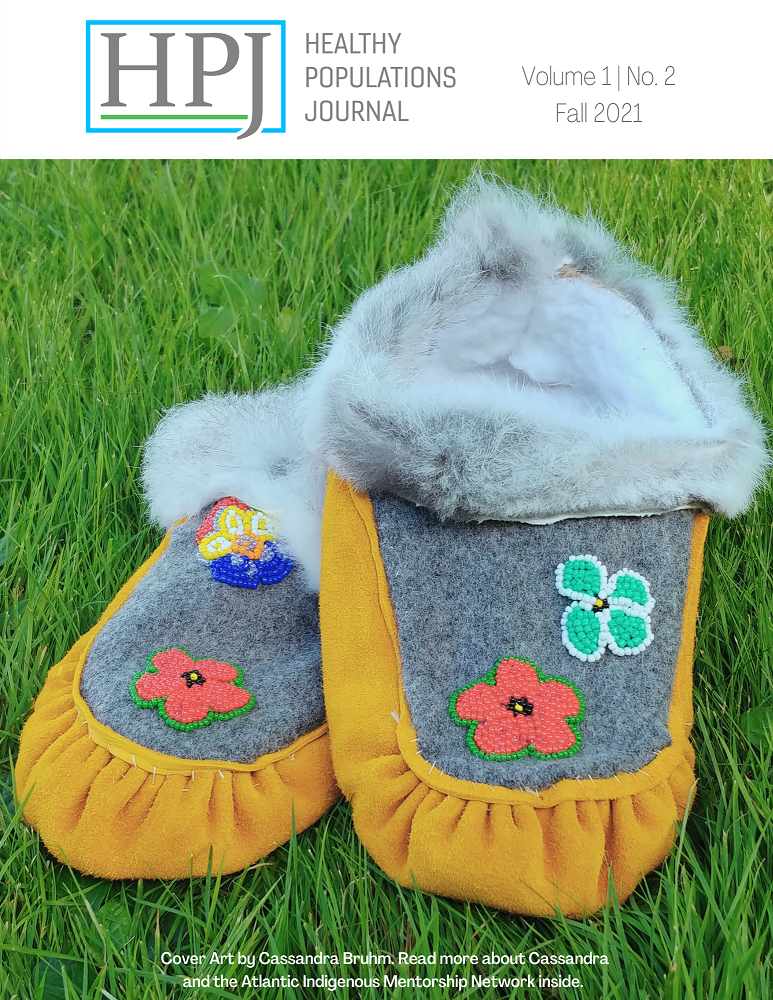Infographic: Intimate Partner Violence Interventions Relevant to Women During the Covid-19 Pandemic
DOI:
https://doi.org/10.15273/hpj.v1i2.11048Abstract
The COVID-19 pandemic has seen increased rates of intimate partner violence (IPV). This is attributed to greater stress on households and families (e.g., reduced income, limited access to childcare and schools), and isolation from friends and family. Public Health guidance on physical distancing and/or remote delivery of services are helpful for reducing the spread of infection, yet these restrictions can create further challenges and barriers for women seeking IPV services. In this review, we synthesized evidence from 4 systematic reviews and 20 individual studies to suggest how IPV services, supports, or interventions for women might be adapted within the context of the COVID-19 pandemic. Interventions generally fit into four main categories: 1) Preventing IPV through early recognition and awareness of IPV; 2) Counteracting abuse and breaking free; 3) Supporting women while living with and/or leaving an abusive partner; and 4) Supporting women after leaving an abusive partner. Many initiatives depend primarily on technology such as mobile phones and an internet connection for delivering information and interventions (e.g., mHealth, telehealth, websites, digital applications). However, it is important to consider that technological interventions are not available to all women given the financial resources necessary to secure a device and access to reliable internet. The results of this review can inform the service provision during the remainder of the COVID-19 pandemic and may be especially important for supporting women who have little access to face-to-face services (e.g., women living in rural and remote places where there are few in-person services).
References
Abeid, M., Muganyizi, P., Mpembeni, R., Darj, E., & Axemo, P. (2015). A community-based intervention for improving health-seeking behavior among sexual violence survivors: A controlled before and after design study in rural Tanzania. Global Health Action, 8, Article 28608. https://doi.org/10.3402/gha.v8.28608
Aromataris, E., Fernandez, R., Godfrey, C., Holly, C., Khalil, H., & Tungpunkom, P. (2020). Umbrella reviews. In E. Aromataris, & Z. Munn (Eds.), JBI Manual for Evidence Synthesis. Joanna Briggs Institute. https://synthesismanual.jbi.global. https://doi.org/10.46658/JBIMES-20-11
Aromataris, E., & Munn, Z. (2020). JBI Manual for Evidence Synthesis. Joanna Briggs Institute, Adelaide, Australia. https://synthesismanual.jbi.global. https://doi.org/10.46658/JBIMES-20-01
Bogart, N. (2020, May 3). Advocates scramble to help domestic violence abuse victims as calls skyrocket during COVID-19. CTV. https://www.ctvnews.ca/health/coronavirus/ advocates-scramble-to-help-domestic-abuse-victims-as-calls-skyrocket-during-covid-19-1.4923109
Enright, M. (2020, May 1). Calls are down to women‘s shelters during the pandemic, but it‘s not good news. The Sunday Edition, CBC Radio. https://www.cbc.ca/radio/sunday/the-sunday-edition-for-may-3-2020-1.5547652/calls-are-down-to-women-s-shelters-during-the-pandemic-but-it-s-not-good-news-1.5547818
Ford-Gilboe, M., Varcoe, C., Scott-Storey, K., Perrin, N., Wuest, J., Wathen, C. N., Case, J., & Glass, N. (2020). Longitudinal impacts of an online safety and health intervention for women experiencing intimate partner violence: Randomized controlled trial. BMC Public Health, 20(1), Article 260. https://doi.org/10.1186/s12889-020-8152-8
Khaki, L. (2016). Comparing the effectiveness of an interactive internet based safety-seeking decision aid for African American and white women in abusive relationships (Publication No. 10241710) [Doctoral dissertation, Morgan State University]. ProQuest Dissertations and Theses Global.
McDonald J. & Green R. (2001). A dispersed refuge model for women escaping domestic violence: A regional case study. Australian Journal of Primary Health, 7(1), 85–89.
https://doi.org/10.1071/PY01014
World Health Organization. (2020). COVID-19 and violence against women: What the health sector/system can do. https://www.who.int/reproductivehealth/publications/vaw-covid-19/en/
”ƒ


